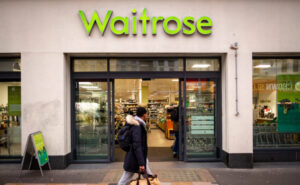The owner of John Lewis and Waitrose is planning to cut 1,000 jobs in stores as part of an effort to cut costs.
The John Lewis Partnership (JLP) said it would aim to find new jobs for those losing their store management roles and would try to reduce compulsory job cuts by offering voluntary redundancy to those affected.
The group said it was simplifying its store management structures under a plan to reduce costs by £300m a year by 2022.
JLP vowed to cut costs after reporting its first full-year loss in March and ditching its annual staff bonus for the first time in 67 years.
A spokesperson said: “We have announced to our [staff] our intention to simplify our management structures in Waitrose and John Lewis stores, which will allow us to reinvest in what matters most to our customers.”
The job cuts, first reported in the trade journal Retail Week, come after a tough few years for the staff-owned group, which employs more than 80,000 people. It has closed 16 John Lewis stores, including major outlets in York, Peterborough, Sheffield and Aberdeen, with the loss of more than 2,500 jobs.
JLP announced it was cutting a further 1,500 head office jobs in November last year as new chairman Sharon White laid out a revival strategy for the business. The group has also axed one in three senior head office management posts – 75 out of 225 – as part of a reorganisation announced in 2019.
The store management changes reflect similar cost-cutting moves taken by retailers including Sainsbury’s, Tesco and Morrisons in recent years.
A wave of store closures and tightening of staff rotas has led to 11,000 fewer people working in retail jobs in the year to the end of March, according to the Office for National Statistics, despite that figure including an increase in employment by online retailers.
John Lewis and other department stores have been hit particularly hard by changing shopping habits as well as by the Covid-19 pandemic, which forced non-food retailers to close their doors for many months.
The switch to online shopping, increased competition and the heavy costs associated with large premises, including business rates, have led to the demise of several rival department store chains.
Debenhams now trades only online, while Beales has closed all but a handful of stores. House of Fraser has cut back its store numbers by about a quarter.
The British Retail Consortium and the shop workers’ union Usdaw have called for an urgent revamp of business rates. A business rates holiday introduced last year to help firms through the pandemic began to unwind this month.
The government has said it is reviewing the tax system and is expected to publish its findings this autumn. Retailers say the process is too slow, as businesses are being taxed on property values that are more than five years out of date, while online sellers pay much lower taxes because they operate from fewer properties.
Paddy Lillis, the general secretary of Usdaw, said 180,000 people had lost their jobs in retail in the last year and 200,000 more jobs could go in the year ahead.
“Retailers need urgent measures to deal with the immediate crisis and a longer-term strategy to tackle the more fundamental structural issues,” he said.
“Usdaw is calling for the government to adopt an urgent recovery plan that levels the playing field between high street and online retailers. There needs to be fundamental reform of business rates. The call for some form of online sales tax is getting stronger and a levy set at 1% of online sales would raise around £1.5bn, which could fund a cut in business rates of around 20%.”
Read more:
John Lewis and Waitrose owner to cut 1,000 jobs in stores
















